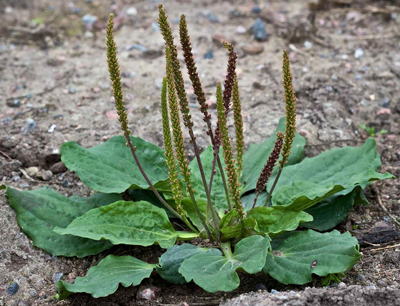(from Herbalism)
Food:
"Leaves, stalks and seeds are edible. Leaves can be eaten as any leafy green vegetable. Young leaves, and those not exposed to harsh conditions like excessive drought are tenderer. It can help palatability to remove thevery fibrous mid-vein and other ribs from the leaf.
Seeds can be eaten raw or cooked (often boiled). Young flower stalks can also be eaten like green beans." (Morgan 166)
"Plantain seeds can be dried and ground into meal or flour for use in bread or pancakes." (Kershaw 199)
Recipe: Herb Infused Olive Oil with Steamed Plantain Salad
"For the oil: This works especially well if you have an herb garden. Harvest tarragon from your garden. Wash and pat dry. Allow to dry (just the water from rinsing it, not the entire herb). Place 1/4 cup fresh herbs in a 1/2-quart jar, and fill with good quality olive oil. Do not pack tightly; leave plenty of room for the oil. Place in the back of your cupboard and allow to infuse for 1 to 2 weeks. Strain herb out and retain oil.
For the salad: Harvest plantain leaves and remove the tough mid-vein. Chop into strips and steam until the leaves turn darker green and collapse. Remove from heat, and place in serving bowl atop fresh lettuce greens. Sprinkle with infused oil and a touch of sea salt. Sprinkle with seeds of the plantain if they are in season. Otherwise, flax or sunflower seeds are a nice alternative." (Morgan 166)
Medicine:
"Plantains are rich in vitamins A,C, and K. The leaves and leaf juice have been widely used in poultices and lotions for treating insect bites and stings, snake bites, sunburn, poison-ivy rashes, sore nipples, blisters, burns and cuts. Plantain leaves have also been heated and applied to swollen joints, sprains, strained muscles and sore feet. In Latin America, common plantain is a prominent folk remedy for treating cancer. Plantain tea has been used for centuries to treat sore throats, laryngitis, coughs, bronchitis, tuberculosis and mouth sores these plants are said to have anti-inflammatory effects. Also they contain flavonoids (which are anti-bacterial), allantoin (a soothing compound that promotes healing of injured skin cells) and tannin (whose astringency helps to draw tissues together and stop bleeding). Preliminary studies indicate that plantains may reduce blood pressure, and their seeds have been shown to reduce blood cholesterol levels. Plantain seeds are rich in mucilage, and they were widely used as a source of natural fiber, with laxative effects. They were also used in medicinal teas for treating diarrhea, dysentery, intestinal worms and bleeding of mucous membranes. The roots were recommended for relieving toothaches and headaches and for healing poor gums."(Kershaw 199)
Recipe 1: Poultice for Insect Bites
"Crush several clean leaves by chewing them gently between the teeth. Place directly onto welt caused by an insect bite. Hold in place until pain and swelling subside. Depending on the severity, you may want to replace with a fresh poultice after a while. If you are treating someone else, you may choose to crush the leaves in your hands to make the poultice or have the patient chew the leaves. NOTE: This is not a remedy for poison-infused bites, such as those from a venomous spider." (Morgan 165)
"I have heard that chewing plantain leaves can be effective in creating and aversion to smoking tobacco. Use as a cold infused tea or poultice. Seeds have fiber and can be used as a supplement and a laxative or, like psyllium, for intestinal health. Plantain is astringent, antimicrobial and anti-inflmmatory." (Morgan 166)
"The fresh juice or dried leaves in tea can help bladder inflammations. If a juicer is available, a fine douche for vaginitis is made by combining two tablespoons of Plantain juice and a pint of warm water with a pinch of table salt. The dried leaves or roots will be found useful in treating chronic lung problems in children; a mild cup of tea (scant teaspoon in hot water) every morning. The fresh juice can be almost miraculous in mild stomach ulcers; it can be preserved with twenty-five percent vodka or ten percent grain alcohol, one teaspoon in warm water one hour before every meal until pain ceases." (Moore 129)
Other Uses:
"Strong plantain tea was sometimes used as a hair rinse for preventing dandruff. The tough veins of mature leaves are amazingly strong and have been used as a source of fiber for making thread, fishing line and even cloth. Plantain seeds, soaked in water, produce a mucilaginous liquid that was used as a wave-set lotion."(Kershaw 199)
Internet Resources
